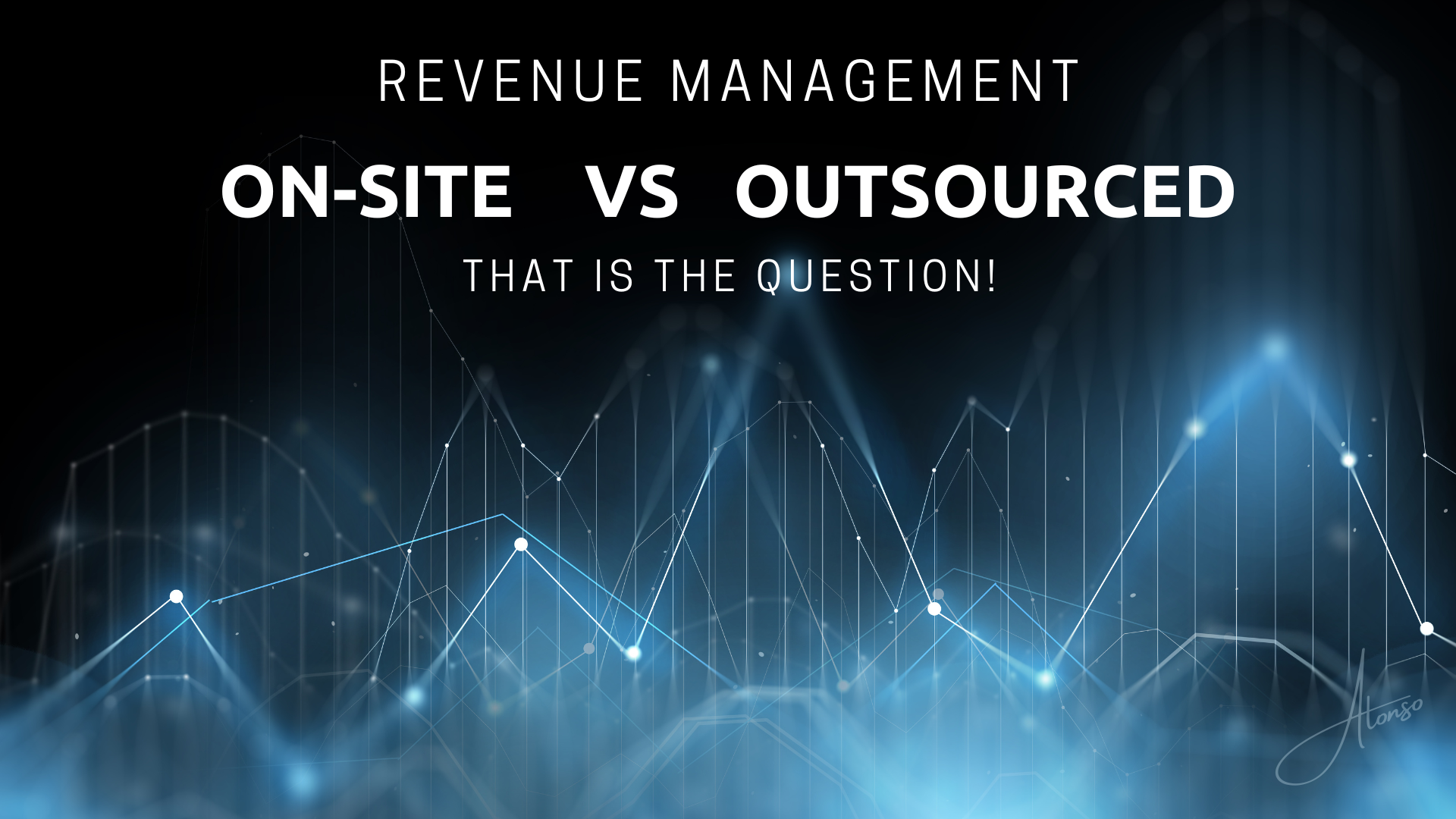Maximising revenue is crucial for hotel success, and an effective revenue management strategy is key. Many hotel operators face the dilemma of managing revenue on-site or outsourcing this function, each with its own pros and cons. The choice depends on the hotel's specific needs and circumstances, and the decision should be taken after careful consideration.
Both models can be effective for different hotel setups. However, a thorough analysis is essential to assess all benefits and drawbacks and ensure we choose the best option for our business needs. When deciding whether to manage revenue in-house or outsource it, several crucial factors must be considered to ensure the best fit for your hotel’s needs.
This article explores the advantages and disadvantages of both in-house and outsourced revenue management, helping hoteliers make informed decisions. While in-house management and outsourcing both aim to increase revenue, they differ in cost, time, and approach. By carefully weighing these factors, you can make an informed choice that aligns with your hotel's goals and operational needs. Here are the main considerations to bear in mind:
MAIN CONSIDERATIONS FOR A PROPER INFORMED DECISION
ASSOCIATED COSTS: Cost is a primary factor to consider when developing a revenue management strategy for your hotel. It’s crucial to evaluate the financial implications of both in-house and outsourced options to determine if you will achieve the desired return on investment (ROI). Outsourcing can often be more cost-effective. The salaries of in-house revenue managers fluctuate based on their expertise and experience, whereas outsourced services usually come with a fixed cost, regardless of the manager’s background. This fixed cost may include access to highly experienced professionals, possibly exceeding the qualifications of an in-house hire.
Investing in effective revenue management strategies is not an expense; it's a profit generator.
KNOWLEDGE AND EXPERIENCE: In-house revenue management professionals concentrate exclusively on your property, gaining an in-depth understanding of your specific operations. On the other hand, outsourced managers handle multiple properties across different regions, offering them wider exposure and the capability to create more adaptable and effective strategies. This diverse experience can be highly beneficial, enabling them to draw on a variety of scenarios and solutions.
ACCESSIBILITY | AVAILABILITY: Accessibility can greatly influence your decision. In-house professionals usually work set hours, which might not meet all your requirements, especially if you need support outside of regular business hours. In contrast, outsourced services often offer 24/7 support via chat, email, and phone, ensuring you have assistance whenever necessary. This constant availability can be particularly advantageous for hotels that require continuous pricing adjustments and prompt reactions to shifting market conditions.
DATA ACCESSIBILITY AND INSIGHTS: Having access to comprehensive data is crucial for making well-informed pricing decisions. In-house managers may have a more limited data set, focusing primarily on your property and its specific strategies. In contrast, outsourced managers can tap into a vast array of data from multiple properties across different markets. This broader perspective offers more comprehensive insights, enabling the development of more robust and competitive pricing strategies. The extensive data pool that outsourced managers have at their disposal allows for a deeper analysis and more strategic decision-making, ultimately enhancing your hotel's revenue potential.
“You have to generate revenue as efficiently as possible. And to do that, you must create a data driven sales culture. Data trumps intuition.” – Dave Elkington
OPERATIONAL EFFECTIVENESS: Operational efficiency is another crucial factor to consider. In-house managers are constrained by their working hours and individual capacity. On the other hand, outsourcing means you are investing in a service rather than relying on an individual’s availability. Service providers can assign multiple managers to your account, ensuring continuous and effective operations. Their focus is on delivering optimal outcomes, which often results in greater efficiency compared to in-house teams.
STRATEGY: A solid strategy is crucial for enhancing your hotel’s profitability. In-house managers devise strategies based on insights specific to your property. Conversely, outsourced services leverage extensive industry connections and experiences, maintaining ongoing interactions with OTA managers and diverse hotels facing various challenges. This exposure enables them to create more innovative and effective strategies.
CUSTOMER EXPERIENCE: Outsourcing revenue management can also elevate the guest experience. By freeing up your time and resources, you can focus on maximizing staff productivity and enhancing guest interactions. While your outsourced revenue manager focuses on revenue enhancement, your in-house team can dedicate themselves to delivering exceptional service, leading to overall improved guest satisfaction. In any case, effective revenue management contributes to improved guest satisfaction by ensuring competitive pricing, availability, and personalised offers. This impact is crucial as guest experience directly influences repeat business and brand reputation.
"Focusing on the customer makes a company more resilient" JEFF BEZOS
 Data management and BI-informed reports for proper data-driven decisions.
Data management and BI-informed reports for proper data-driven decisions.
ON-SITE REVENUE MANAGEMENT | PROS AND CONS
ADVANTAGES:
- Proximity to Operations: An on-site revenue manager possesses intimate knowledge of the hotel’s daily operations, guest demographics, and local market dynamics. This proximity enables prompt decision-making and swift adaptation to changes in occupancy and market trends.
- Customisation: On-site managers can tailor revenue strategies to closely align with the hotel’s specific objectives and brand identity. They collaborate directly with departments like marketing and sales to develop cohesive strategies that foster revenue growth.The operational synergy will go beyond revenue management, on-site managers contribute to overall operational synergy by fostering collaboration across departments. Their involvement in cross-functional teams ensures that revenue strategies are not only financially sound but also operationally feasible, considering factors such as inventory management and staffing levels. This is what I call ¨Inclusive Revenue Management¨
- Control: Maintaining an in-house team allows for direct oversight and guidance of revenue management processes. This ensures strategies are aligned with the hotel’s overall vision and operational standards.
DISADVANTAGES:
- Cost: Employing and sustaining an on-site revenue management team can be costly. Expenses such as salaries, benefits, training, and overheads can accumulate, particularly for smaller hotels with limited financial resources.
- Resource Limitations: Smaller hotels may encounter challenges in recruiting and retaining qualified revenue managers. In-house teams might also lack the extensive experience and specialized knowledge offered by larger, outsourced firms.
- Scalability: Scaling an on-site revenue management team can pose difficulties for hotels aiming to expand. It often necessitates additional hiring and training efforts, which can be time-consuming and financially burdensome.
OUTSOURCED REVENUE MANAGEMENT | PROS AND CONS
ADVANTAGES:
- Expertise and Experience: Partnering with a specialized revenue management firm provides access to a team of seasoned professionals with extensive industry knowledge. These experts possess a deep understanding of market dynamics, advanced analytics, and cutting-edge revenue management technologies.
- Cost Efficiency: Outsourcing can offer significant cost savings, especially for smaller hotels. It eliminates the overhead costs associated with maintaining an in-house team, opting instead for pay-as-you-go services.
- Advanced Tools and Technology: Outsourced firms typically utilize sophisticated revenue management tools and software. These resources enable precise forecasting, dynamic pricing strategies, and real-time data analysis, facilitating well-informed decision-making.
- Scalability: Outsourced revenue management firms can easily adjust their services to accommodate the growth of your hotel. This scalability ensures seamless transitions during periods of expansion or market fluctuations.
DISADVANTAGES:
- Reduced Control: Outsourcing involves relinquishing some control over your revenue management strategies. While firms collaborate closely with clients, there may be less direct oversight compared to an in-house team.
- Potential Disconnection: External teams may not have the same familiarity with your hotel's operations, culture, and local market nuances. This can occasionally result in strategies that do not fully align with your hotel's specific needs.
- Communication Challenges: Effective coordination with an external firm requires clear and consistent communication. Any lapses in communication can lead to misunderstandings or delays in implementing strategies.
 Tracking market trends and predicting behaviours.
Tracking market trends and predicting behaviours.
WHICH STRATEGY IS RIGHT FOR YOUR HOTEL?
Deciding between on-site and outsourced revenue management hinges on several factors tailored to your hotel’s unique circumstances.
- SMALLER HOTELS: For smaller establishments operating within constrained budgets, outsourcing offers an avenue to access specialised expertise and advanced tools without the financial commitment of maintaining an internal team.
- LARGER HOTELS: Hotels with expansive operations may find value in the direct oversight and tailored strategies provided by an on-site revenue management team. However, considering a hybrid approach—where outsourced specialists handle specific functions while an internal team manages daily operations—could also be advantageous.
- BOUTIQUE AND LUXURY HOTELS: These establishments often prioritise personalised guest experiences and brand consistency, qualities that an on-site team can effectively cultivate. Nevertheless, periodic consultations with external experts can provide valuable insights into industry trends and best practices, enhancing overall strategic direction.
FINAL THOUGHTS
Regardless which model may best fit your operation needs, I strongly believe on the benefits of developing an inclusive revenue management strategy. It is imperative for hotels to integrate staff participation in selling and customer service as integral components.
By empowering staff to embody and communicate the unique brand identity and value proposition of the hotel, revenue management transcends mere numerical goals to encompass a holistic approach focused on guest experience and satisfaction. This strategy not only fosters a deeper connection between staff and guests but also promotes operational synergy across departments, ensuring cohesive implementation of revenue strategies that align with the overarching brand vision.
By emphasising the intrinsic qualities that differentiate the hotel in the market, such as its distinctive ambiance, service ethos, and localised experiences, an inclusive revenue management strategy positions the hotel competitively while nurturing a culture of excellence and innovation. Ultimately, this approach enables hotels to optimise revenue growth sustainably, driven by a unified commitment to delivering exceptional guest experiences and enhancing the overall value proposition of the hotel.
Whether you choose to maintain an in-house team or leverage external specialists, the ultimate goal remains the optimisation of pricing strategies, improvement of guest satisfaction, and enhancement of profitability.
In conclusion, the decision between on-site and outsourced revenue management is pivotal for your hotel's financial health and guest satisfaction. It demands a thorough evaluation of factors such as operational requirements, financial capabilities, and the expertise needed to optimise revenue. By carefully evaluating the pros and cons of each approach, you can make a well-informed decision that enhances your hotel’s revenue and ensures long-term success.
Both on-site and outsourced strategies have their merits, and the optimal solution will depend on your unique circumstances. If you find yourself navigating this decision and could benefit from further guidance, don't hesitate to reach us for assistance. Experienced consultants and industry experts can provide valuable insights tailored to your specific challenges and goals.Start writing here...
On-Site vs. Outsourced Revenue Management Strategy for Your Hotel: Which Is Right for You?